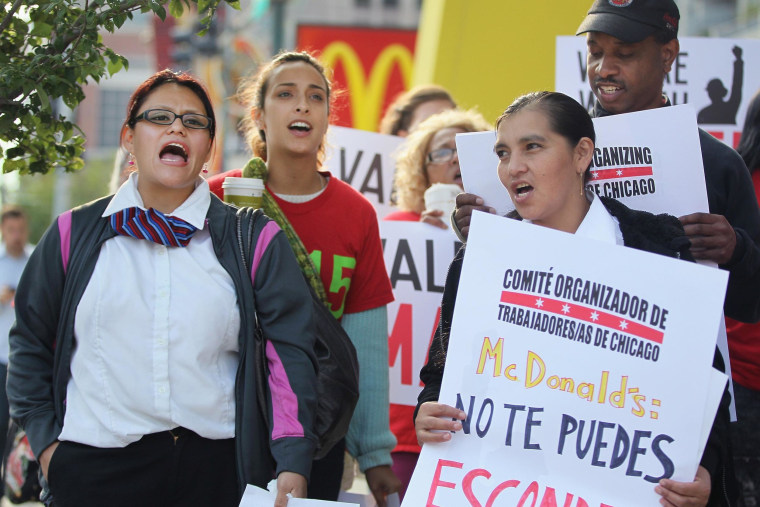A ruling by the legal arm of the National Labor Relations Board against McDonald's will change how the restaurant chain deals with labor disputes and could lead to some industries becoming more unionized, a labor expert says.
"I think it will embolden the labor movement, especially among fast food workers," said Jason Bent, a professor of employment law at Stetson University College of Law in Florida. "Industries that use franchises or that use contract labor will have to worry about this when it comes to organized labor targeting their workers."
Although the ruling was not related to the issue of wages, fast-food companies such as McDonald's have been the targets of recent protests by unions and workers around the country pushing for a minimum hourly wage.
NLRB general counsel Richard Griffin Jr. wrote in a letter on Tuesday that 43 of 181 worker complaints filed against McDonald's have merit and that the fast food chain would be named as a joint employer. That means McDonald's could be liable for unfair labor practices, like low pay, at the franchise locations.
Franchises are purchased by an individual or group to sell a company's goods within a certain area or location.
"The NLRB letter means that not only is the franchise owner responsible for making sure there's fair working conditions, but also a firm like McDonald's is responsible," said Kathy Ruckelshaus, general counsel for the National Employment Law Project, a pro-workers organization.
She added, however, that it's too soon to tell whether the ruling will prove a boon to organized labor.
"They weren't seeking a union, but trying to make their jobs better when it comes to pay," Ruckelshaus said. "We have to wait to see how this plays out."
McDonald's is determined to fight the decision. In an email to CNBC, the company said: "McDonald's will contest this allegation in the appropriate forum. McDonald's also believes that this decision changes the rules for thousands of small businesses, and goes against decades of established law regarding the franchise model in the United States."
McDonald's also said it "does not direct or co-determine the hiring, termination, wages or any other conditions of employment of our franchises."
But despite claims that this ruling violated current laws, it didn't, said Stetson's Bent. He said there are no set rules on whether a franchiser, like McDonald's, is a joint employer with its franchisees. That type of decision is usually decided on a case-by-case basis by the NLRB.
Also, the NLRB as a whole did not rule on whether McDonald's was a joint employer. What Griffin's letter did, Bent explained, was signal a more aggressive approach on worker rights issues by the NLRB.
But the approach has upset leaders in the franchise industry, generating fears that the decision will hurt what they say is a sector for job growth.
"Franchises are seeing twice the rate of jobs as other areas" said Matt Haller, spokesman for the trade group, International Franchise Association. "There's no question it would have a negative impact on franchise expansion."
Haller argued that people buying into a franchise would have to face a host of legal challenges stemming from the NLRB's decision—and that might make them think twice about going into business.
Haller also said the ruling would put a firm like McDonald's in more control of a franchise location—more than a franchise owner would like. But that's a good thing, according to Ruckelshaus of NELP.
"Franchisers shouldn't be able to avoid their responsibility when it comes to worker issues," she said.
